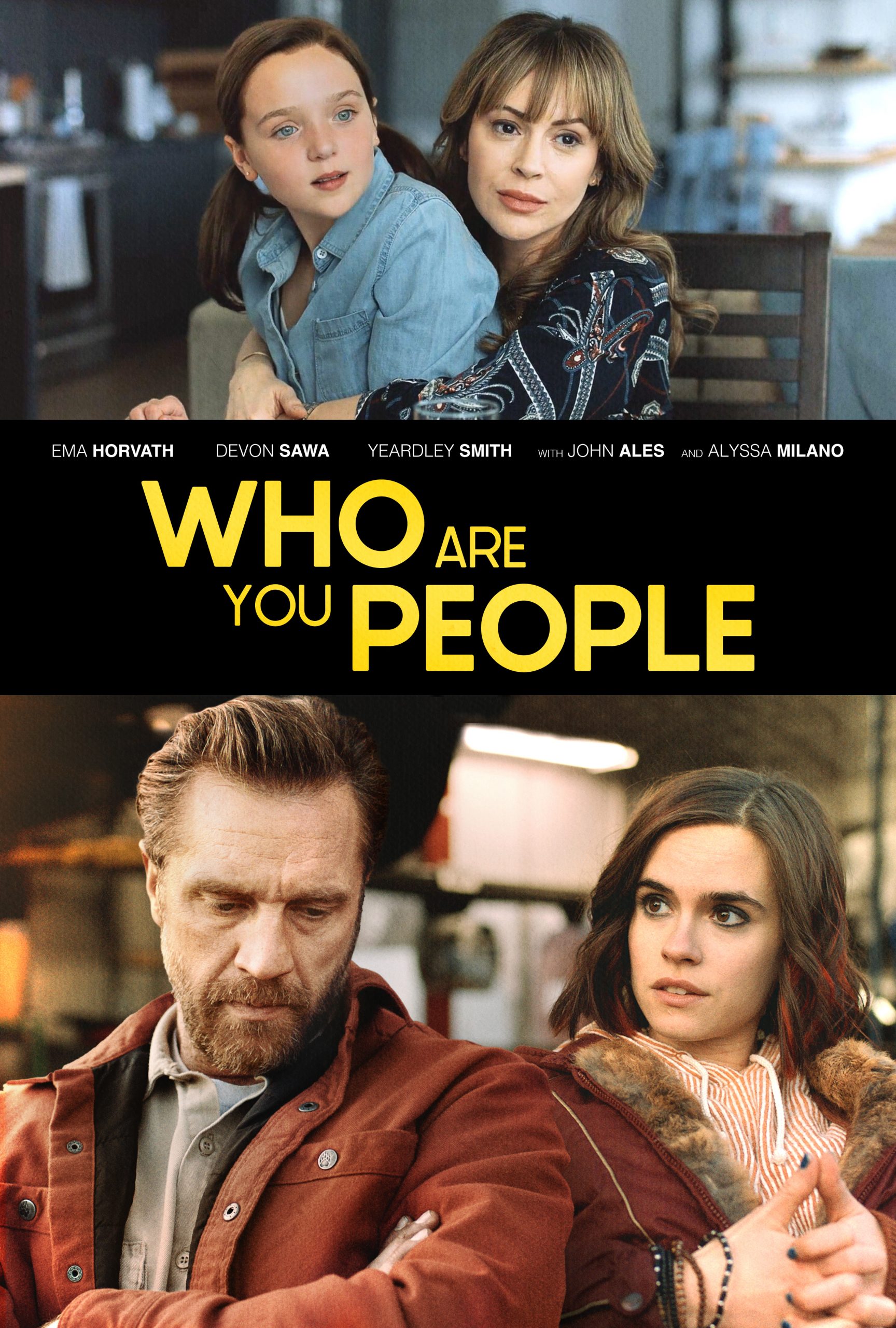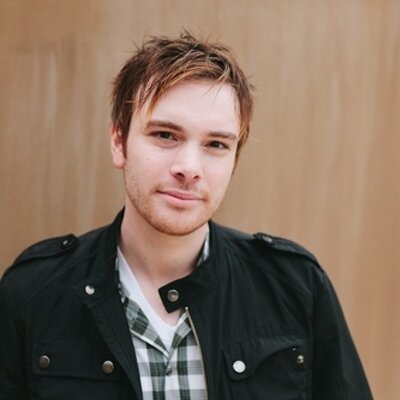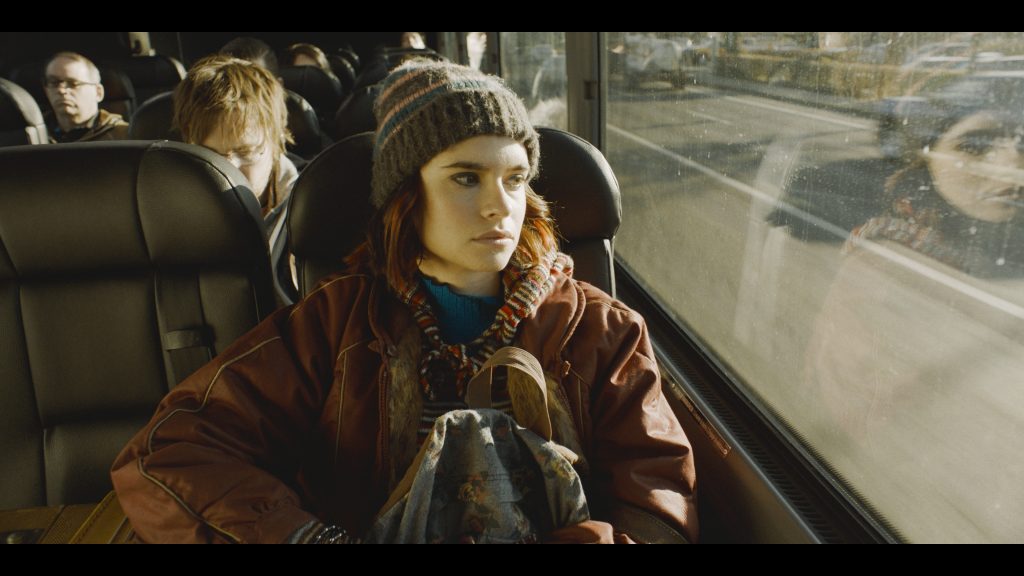Filmmaker 5 with Ben Epstein: Who Are You People

In Who Are You People, a family drama unfolds through the eyes of 16-year-old Alex who wonders about her parents “who are you people.” Seeking answers to understand her identity and why she doesn’t seem to fit in, she digs up past family secrets and undertakes a journey to confront her discoveries. Along the way, she exposes truths she’s not prepared for as she discovers that sometimes life’s biggest questions only provide more questions.
Ema Horvath stars as Alex, giving a performance that garnered festival accolades. She’s joined by actors Devon Sawa, Yeardley Smith, Peter Parros, Siddharth Dhananjay, and Reid Miller, with John Ales and Alyssa Milano rounding out the accomplished cast. Who Are You People arrives at select theaters and is out on VOD February 24, 2023. Our Classic Couple Academy interview with Who Are You People writer and director Ben Epstein follows.
Filmmaker 5.1: You’ve written for TV as an episodic medium. How does writing for a feature film differ and how is your storytelling approach the same?

That is a very interesting question. And I think it really depends on the type of TV show it is. I’ve been the showrunner and I have been a member of the writing staff. Most recently I was on the writing staff of a Netflix show. And I think that they’re completely different animals from each other. When doing a TV show, it’s really about serving the showrunner’s vision, but it’s much less of a one voice and more of a how do we help embellish and buttress up this voice and make it the best version of what it can be? That is essentially the TV writer’s job.
Whereas the film is much more like you’re wrestling it yourself down to the ground and finally, get it down. For film, especially an indie film that I had the intention of directing, it was much more personal. This is a very specific sensibility that I don’t need to sort of adjust or make palatable for someone else. And then, the writing very much gets to be less my sensibility and more what the film sensibility wants to be, if that makes sense.
So, I would say that they’re different beasts. And I really love both, and I miss one when I’m doing the other.
Filmmaker 5.2: Can you speak to your journey of writing Who Are You People?
I think this is a story for film that I kind of grew into; I had the idea a really long time ago. The story kind of fell out of me very quickly. And then I worked on it at different times over the years. Finally, I had a version that I was like, “Yeah, this is ready to show to my reps. We’re going shoot it.” And that was 2009.
I kept working on it over the years, and I kept growing as a writer and doing more stuff and getting more adept at the craft. I didn’t want to let the story go, and I knew that I could always make it a little better. The rewriting process never stopped. It didn’t even stop after we shot the movie. I think we were still rewriting up until the last day of editing.
Filmmaker 5.3: The cast of Who Are You People is stellar. What was your directorial approach to bring forward these performances?
Thank you very much. I appreciate that. The cast really does elevate it so much, and I’m incredibly fortunate that we were able to assemble this group of actors.
In terms of what my approach is, a lot of people think that directing is about protecting your script. And I think it’s sort of the opposite. There were times when we really pivoted from what the script was.
For me, once an actor comes and takes on a character, I am no longer the foremost authority on who that person is. I have to have a shared vision with the actor. I spent time talking with each of them about who their character was, and that took on different shapes.
Devon Sawa, who played Karl, wanted to go through every scene. Ema Horvath, who played Alex, wanted to have more broad strokes. Yeardley Smith, who played Sarah, really wanted to talk about her backstory. We did whatever it was to make sure that the actors felt ownership and tapped into their character so that so that no one was ever on set saying why am I doing this?
I think the biggest thing about directing is to know that on the page you can write anything, but when you’re directing, you have to make sure that the impulse that you wrote down is filmable. I had gone through the script many, many times to the point where I knew what the intention was behind most of what happened, but I still got surprised that every single actor found something new or different in it. As a director, I wanted to give them the freedom to surprise me. Actors are people who can bring something to it and they’re better at performing than I am. So, they were able to find new things that I didn’t intend or didn’t know about. And a lot of those moments are in the movie.

Filmmaker 5.4: What was a standout moment in filming Who Are You People?
There were a lot of standout moments every day where someone surprised me with something. The most emotional moment of the movie for me on a pure this is hurting me level is something that came out of Ema Horvath’s performance when she said, “Don’t ever talk to me again” when Alex and Karl are on the phone. She’s in the motel and he’s in the basement. And it’s the way she says it. I really believe her; I really believe she’s hurting. I believe she’s 16. I believe she’s in this moment with her father and dealing with all these complicated feelings from what she’s learned. That was a line that I wrote, and as I was writing I thought it was a good scene. But when I actually cut it together, I was like, Holy shit, this is much more powerful because of her than I ever knew it could be.
Sometimes the stuff that I tried to micromanage as a vision I’d always had were less effective than being open to the process of seeing what someone else brought to it. The actors, the crew, everyone all found ways to surprise me. That’s the biggest joy of making something like this.
Filmmaker 5.5: This is a coming-of-age story and a complex family drama. What conversations do you wish to inspire with this film?
Wow, that’s a great question. It’s a kind of delicate one. I don’t believe the movie has a message. I don’t always think movies should. I think that the world is a complicated place and people are more than one thing. And sometimes it’s hard to see the breadth of the nuance of who anyone is. I don’t always think human beings behave in rational ways. And I think that the more we acknowledge the complexities of humanity, and that we don’t always do what’s rational or right or moral—because that’s what it means to be human—that’s what I want to come out of this.
I like movies that leave you debating and thinking. On set I had one crew member come up and say, “Do you think Alex and Karl will have a relationship with the movie? I really hope they do. I really think they should. I think they’re both better off for it.” And I said, “Yeah, I understand that.” And another crew member later that day came up and said, “I don’t see how they can ever have a relationship.” And I said, “Yeah, I totally get it.” And I love that that was a conversation. That was happening.
There are no moral questions in this movie. They’re pretty clear to me. I think they’re clear to the characters and they’re clear to me. It’s what comes after the obvious moral stuff that I think is really interesting. So that’s what I want people to be talking about.
Classic Couple Recommends
Watch the Who Are You People Trailer.
